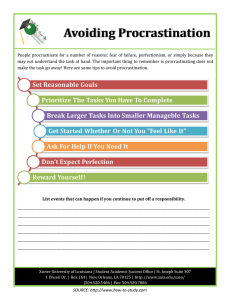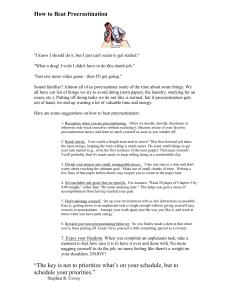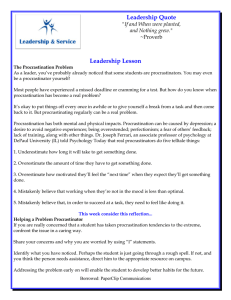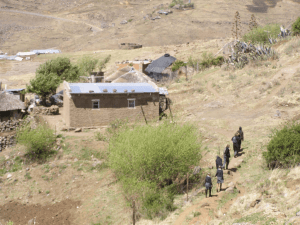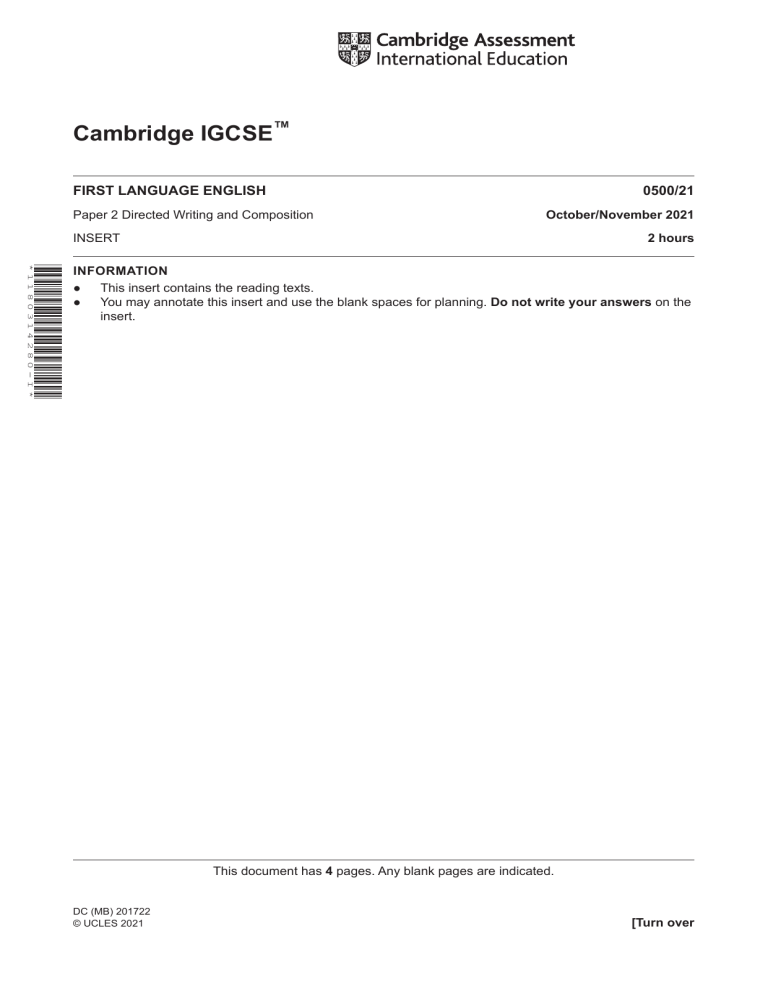
Cambridge IGCSE™ FIRST LANGUAGE ENGLISH Paper 2 Directed Writing and Composition 0500/21 October/November 2021 2 hours INSERT *1180314280-I* INFORMATION ● This insert contains the reading texts. ● You may annotate this insert and use the blank spaces for planning. Do not write your answers on the insert. This document has 4 pages. Any blank pages are indicated. DC (MB) 201722 © UCLES 2021 [Turn over 2 Read both texts, and then answer Question 1 on the question paper. Text A: The problems of putting things off and why we do it Have you ever sat down to complete an important task only to discover a fascinating Wikipedia1 entry about ants, or decided that you should go ahead and ‘get lunch out of the way’, even though it’s only 11:00 a.m.? The next thing you know, it’s the end of the day; your important task remains unfinished with the deadline looming. 5 For many of us, procrastination (putting off or delaying something) is a habit that stops us tackling the most urgent tasks, decisions and ambitions in our lives. We waste time doing things that aren’t important, reading emails and checking our diaries, because being busy makes us feel productive – even if we’re not. Procrastination is a dangerous force. Victims can perform poorly at work, put off medical treatment or delay saving for retirement. A recent study found that procrastinators among university students ended up with higher stress and lower grades. But the reasons people procrastinate aren’t well understood. Some researchers view procrastination as a failure of self-control – like other bad behaviours such as overspending. Others say it’s not a matter of laziness or poor time-management, as many smart overachievers procrastinate. Many experts see procrastination as an avoidance behaviour, happening when people fear, or have anxiety about, the important task awaiting them. To avoid this negative feeling, people procrastinate – they open up a video game or magazine instead. They feel better temporarily, but unfortunately, reality comes back to bite them in the end. 10 15 20 Once the reality of a deadline sets in again, procrastinators feel shame and guilt. These negative feelings become another reason to put the task off. The behaviour turns into a vicious, selfdefeating cycle. Some people thrive on deadlines, others panic, putting off tasks and decisions without thinking of the implications for their future self. Some procrastinators are perfectionists, so keen to achieve a flawless end result that they’re unable to take the first step. 25 A recent study found that we waste on average 69 minutes a day on procrastination – interesting, but unsurprising with the advent of mobile phones, text messages and the internet, and the massive temptations and opportunities they offer for wasting time. The typical advice for procrastinators – essentially, to stop it and get down to work – isn’t useful. Procrastination isn’t something that extreme procrastinators feel they can control. Interestingly, research suggests that one of the most effective things that procrastinators can do is to forgive themselves for procrastinating. This reduces the guilt they feel about procrastinating – one of the main triggers for procrastinating in the first place. 1Wikipedia: © UCLES 2021 an online encyclopaedia which is free to use 0500/21/INSERT/O/N/21 30 3 Text B: Procrastination is positively good for you In the past, my procrastination was always a massive waste of time. Rather than complete work I should be doing, I’d play video games, eat junk food or nap for hours during the day. Today, I’d call myself a positive procrastinator. It’s not that I don’t procrastinate anymore. It’s just that I procrastinate on a much higher level. Nowadays, the time I spend procrastinating is almost always productive. I read a book, hit the gym or listen to a podcast while going for a walk. 5 You see, I may not always have the willpower to work on my most pressing priority, but at least I’m busy with other activities. Just because I don’t get the most important thing done doesn’t mean I can’t get anything done at all. Let’s say I need to prepare for an important meeting, but can’t get myself to do it. What now? Well, I make a list of activities and see if there’s a more attractive task I could be working on instead. I might do the laundry or paint a picture. This way, I’m getting things done and my to-do list is getting shorter. Avoiding something worse means I’m likely to finish all sorts of other unpleasant tasks. We think of procrastination as a curse. Roughly 20 per cent of adults report being chronic procrastinators; we can only guess how much higher the estimate would be if more of them got around to filling out the survey. 10 15 But here’s some good news for all procrastinators out there: the right kind of procrastination is good for you. An online article I was reading earlier argued that we should find time for procrastination as it makes us more creative. Apparently, delaying finishing a task allows the mind to wander and help us come up with more creative ideas than our first, more conventional, ones. Added to that, any decision you were struggling to make might by now be redundant – you didn’t need to worry after all. © UCLES 2021 0500/21/INSERT/O/N/21 20 4 BLANK PAGE Permission to reproduce items where third-party owned material protected by copyright is included has been sought and cleared where possible. Every reasonable effort has been made by the publisher (UCLES) to trace copyright holders, but if any items requiring clearance have unwittingly been included, the publisher will be pleased to make amends at the earliest possible opportunity. To avoid the issue of disclosure of answer-related information to candidates, all copyright acknowledgements are reproduced online in the Cambridge Assessment International Education Copyright Acknowledgements Booklet. This is produced for each series of examinations and is freely available to download at www.cambridgeinternational.org after the live examination series. Cambridge Assessment International Education is part of the Cambridge Assessment Group. Cambridge Assessment is the brand name of the University of Cambridge Local Examinations Syndicate (UCLES), which itself is a department of the University of Cambridge. © UCLES 2021 0500/21/INSERT/O/N/21
